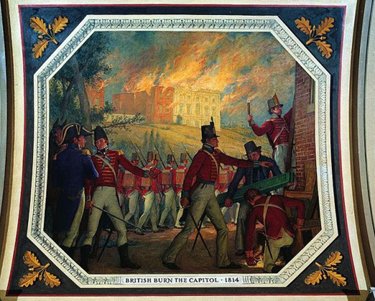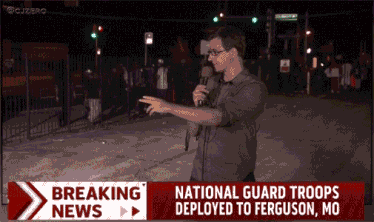Archive for August, 2014
25 Aug 2014

Two hundred years ago, Admiral Cochrane with 4500 troops defeated a mixed American force of militia and naval personnel at Bladensburg, Maryland, then captured and occupied Washington, D.C. On August 24, the British burned the President’s Residence, the Capitol, and the Library of Congress. The British, however, refrained from burning the Marine barracks and the Marine Corps Commandant’s House, as a compliment to Captain Samuel Miller and the 116 Marines who had brought two 18-pounder guns and three 12-pounder guns from the Washington Navy Yard, and placing them astride the Washington turnpike, defied British frontal assaults, until out of ammunition and under attack from the flank, the Marines made an orderly withdrawal functioning as a rear guard and preventing the British from overtaking the routed American militia.
Neat-o-rama
Marines at Bladensburg
25 Aug 2014

Uncredited Photographer, Central Park, New York City, c.1900.
Via Ratak Monodosico.
24 Aug 2014


I was reading recently a book describing the contemporary practices and ethos of the Marine Corps, and found reference to a publishing house (Nautical & Aviation Publishing Co.) offering a product line, principally composed of well-selected reprints, aimed at a professional military readership.
One title, mentioned as a popular favorite almost rang a bell: C.S. Forester’s (non-Hornblower novel) The General.
I could almost swear that I had read it long ago, but the book I remembered had not inspired any particular attachment or respect, and this title was extravagantly praised. I got hold of a copy and could hardly put it down. Its wry and affectionate portrait of the fictional General Sir Herbert Curzon K.C.M.G., C.B., D.S.O. was meat and drink to my reactionary and Anglophilic imagination.
Curzon, known to his family and subordinates as “Bertie,” is a classic British Blimp.
The picture of Curzon in the years immediately before the war seems to verge closely on the conventional caricature of the army major, peppery, red-faced, liable under provocation to gobble like a turkey-cock, hidebound in his ideas and conventional in his way of thought, and it is no more exact than any caricature. It ignores all the good qualities which were present at the same time. He was the soul of honour; he could be guilty of no meannesses, even boggling at those which convention permits. He would give his life for the ideals he stood for, and would be happy if the opportunity presented itself. His patriotism was a real and living force, even if its symbols were childish. His courage was unflinching. The necessity of assuming responsibility troubled him no more than the necessity of breathing. He could administer the regulations of his service with an impartiality and a practiced leniency admirably suited to the class of man for whom those regulations were drawn up. He shirked no duty, no matter how tedious or inconvenient; it did not occur to him to try to do so. He would never allow the instinctive deference which he felt toward great names and old lineage to influence him in anything which he conceived to be his duty. The man with a claim on his friendship could make any demand upon his generosity. And while the breath was in his body he would not falter in the face of difficulties.
Bertie blunders accidentally as a subaltern, while commanding a squadron of cavalry during the Boer War, into a superb position on the enemy’s flank where he is able to deliver a quick charge, gaining Britain a notable victory and winning himself the D.S.O.
When WWI eventually breaks out, Bertie’s previous status as a hero, along with his unrelenting dedication and unflinching courage propel him rapidly upwards in rank. He immediately receives command of his regiment. In the First Battle of Ypres, his commanding general is killed and Bertie inherits command of the brigade.
He continues through the war as a model soldier of the old school, perfectly courageous and reliable, free from selfishness or nerves, entirely a sound man, the soul of duty and loyalty, faithful to tradition, suspicious of novelty, theory, or demonstration or display of any kind.
His military faith is in punctilious planning, perfect execution of classic tactics, and the application of overwhelming force.
He spoke vehemently against the effect on the troops of life in the trenches, and this system of petty ambuscades and sniping and dirt and idleness. And, with his experience of improvised attacks and defence to help him, he was able to say how advantageous it must be to be allowed ample time to mount and prepare a careful attack in which nothing could go wrong and overwhelming force could be brought to bear upon the decisive point. Curzon checked himself at last when he suddenly realized how fluently he was talking. It was un-English and lawyerlike to be eloquent.
Of course, the result of all that planning is the Somme.
Forester then plays tricks on his reader, deliberately undermining his hero by making him suddenly begin to behave meanly and out of character.
Bertie ignores his humble aunt’s request to transfer her son to a non-combat position out of snobbery, and displays actual jealousy of the new-fangled tank arms’ success at Cambrai.
Forester is, of course, arranging Bertie’s downfall and destruction. Now a lieutenant general and commander of a corps, Bertie returns to France to find his sector of the line at the very center of a major German offensive in overwhelming strength. As the Germans begin to achieve a breakthrough, Bertie is obliged to send his former divisional command as a sacrifice into the middle of the breach. Bertie then sends for his horse, buckles his sword onto his Sam Browne belt, and rides toward the enemy, gathering up retreating soldiers as he goes.
Bertie must be made to pay for his fidelity to the tactical approach of General Grant, so at the next crossroads, Forester has him cut down by German artillery, his horse slain, one leg blown off.
General Curzon (out of character, it seems to me) then becomes an invalid in a bathchair, incapable of adapting to an artificial leg, rolled about the promenade in Bournemouth by Lady Emily, his tall and raw-boned wife. Sic transit…
I thought the book was fine, until the author turns upon his character. Still, I suppose Forester is entitled to make the argument that inutile destruction and enormous waste of life of WWI had some specific connection to the virtues (and limitations) of the old school British military. They ought not, it is possible to contend, have been so suspicious of intellectuality and theory. Like the Hun, they should have studied war and built an intellectual General Staff. (But, of course, intellectualism and General Staff and all that, the Hun still managed to lose two wars.)
23 Aug 2014


Michael J. Boyle, an assistant professor of Political Science at LaSalle, in the New York Times, wags his finger, and sermonizes against describing beheadings and mass murder as “immoral” because that might lead to US actions which could trouble his conscience.
Boyle provides a perfect example of the kind of liberal double-think which insists that murderous foreign barbarians are always entitled to complete immunity from morality, the Geneva Convention and other international law, and the rules and customs of war, but any American responses must always be subjected to microscopic ethical analysis and found to be free from any and all contamination by self-interest, world-wide disapproval, collateral damage, or potential untoward consequences of any kind before they can be regarded as licit and be supported by the pure of heart. The enemy is always immune to judgement, but the United States is always in the position of Jonathan Edwards’ “Sinner in the hands of an angry God.”
The beheading of American journalist James Foley by the Islamic State in Iraq and Syria, or ISIS, has rightly provoked global condemnation of the insurgent group and its horrific tactics. Yet it has also led to a disturbing return of the moralistic language once used to describe Al Qaeda in the panicked days after the 9/11 attacks.
In an eerie echo of President George W. Bush’s description of the global war on terrorism as a campaign against “evildoers,†President Obama described ISIS as a “cancer†spreading across the Middle East that had “no place in the 21st century.†Secretary of State John Kerry condemned ISIS as the face of a “savage†and “valueless evil,†while Britain’s prime minister, David Cameron, called the group “barbaric.â€
There is no question that ISIS has committed thousands of grave human rights violations against civilians in Iraq and Syria, and that many of its most gruesome acts, like the execution of Mr. Foley, constitute war crimes. Anyone with a conscience is disgusted by their brutality toward not just Mr. Foley but the thousands of Iraqi and Syrian civilians whom they have killed, raped and even buried alive.
It is natural to want to condemn this organization and to do so in harsh language that fully expresses our revulsion over its tactics. Indeed, condemning the black-clad, masked militants as purely “evil†is seductive, for it conveys a moral clarity and separates ourselves and our tactics from the enemy and theirs.
But if the “war on terror†has taught us anything, it is that such moralistic language can blind its users to consequences. Describing a group as “inexplicable†and “nihilistic,†as Mr. Kerry did, tends to obscure the group’s strategic aims and preclude further analysis. …
he Obama administration should be very careful about lapsing into language about “destroying†the cancer of ISIS without thinking through, and articulating publicly, exactly what that would mean. The strategic drift produced by this moralistic language is already noticeable, as an air campaign first designed to prevent a humanitarian catastrophe has morphed into an effort to roll back, or even defeat, ISIS.
The Obama administration needs to ensure that the just revulsion over Mr. Foley’s murder and ISIS’ other abuses does not lead us down an unplanned path toward open-ended conflict. The language of good and evil may provide a comforting sense of moral clarity, but it rarely, if ever, produces good policy.
Read the whole blithering thing.
23 Aug 2014

Front Page says:
[S]eeing protesters throwing rocks at MSNBC’s Chris Hayes restores our faith in humanity. Whether you’re a cop with a sniper rifle or a looter with fist full of stolen nachos, this animated GIF of rocks being thrown at the smuggest man on the smuggest news network in America shows that there is hope for all of us.
23 Aug 2014


Founded in Fredericksburg, Virginia as the University of Virginia’s women’s college in 1908, the Virginia Normal and Industrial School for Women, later renamed as Mary Washington College, named its college paper “The Bullet” in 1922, the name was an allusion to the college’s location on one of the greatest battlefields of the Civil War. Contemporary hoplophobic priggery has progressed so far, however, that the nincompoops in charge are changing the college newspaper’s name.
National Review On-line:
A Virginia university has decided to stop calling its newspaper “The Bullet†over concerns that the name was so insensitive and inappropriate that it could even make people violent.
The University of Mary Washington’s 96-year-old newspaper will now be called The Blue and Gray Press.
“The editorial board felt that the paper’s name, which alludes to ammunition for an artillery weapon, propagated violence and did not honor our school’s history in a sensitive manner,†newspaper staff said in a release issued Monday.
“The board intends to remain faithful to the history our university stands upon, and we continue to honor this history both in a respectful and meaningful way.â€
22 Aug 2014


Bob Ellis is an illustrious Australian playwright, screenwriter, journalist, filmmaker, and political commentator. Ellis has attracted a great deal of international attention (and incredulity) for his hyper-sophisticated remarks yesterday wondering why there should be so much outrage over the beheading of James Foley by a representative of ISIS. If Joffrey Baratheon can have Ned Stark beheaded, after all…
Queen Elizabeth I, an English hero, beheaded her female cousin. Henry VIII, a popular English monarch, beheaded two of his wives. William Shakespeare, a popular playwright, beheaded no more than eighty of his major characters, including Macbeth, Rosencrantz, Guildenstern, Buckingham, Thomas More and twenty-four of Titus Andronicus’s sons. Charles Dickens, a popular novelist, beheaded his most admired character, Sidney Carton. The Simpsons, a popular television series, beheads in its Halloween specials eight or nine people a year, and in its subseries Itchy and Scratchy hundreds of others. The Simpsons is watched by hundreds of millions of children. And no complaint has been laid. Beheadings occur routinely in Game of Thrones. And no complaint has been laid.
Why then all the fuss? Why especially profess such shock at airbrushed images in which there is no horror at all and serve only, I guess, as Rorschach blots or shadow-puppet silhouettes of imagined beheadings or severed heads?
Read the whole thing.
The only possible observation is that decadence, deracination, and over-exposure to left-wing BS damages the brain and anesthetizes natural human sensibilities, making some people unable to distinguish between contemporary reality and fiction.
22 Aug 2014

Hat tip to Jose Guardia.
22 Aug 2014

Apropos of media coverage of events in Ferguson, The Thinking Housewife quotes the highly unfashionable and totally politically incorrect Princetonian Carleton Putnam, writing in Race and Reality, A Search for Solutions, 1967:
Let a man be told incessantly that everything he and his forefathers had achieved was largely a matter of chance; that the poverty and backward condition of other individuals and races was also largely a question of luck—in fact perhaps even the fault of himself and his forefathers; that his standards of morals, fiscal responsibility and personal integrity were no better than anyone else’s; that his civilization was mostly happenstance and really nothing much to be proud of; that since all humanity were innately equal, all actual differences must be due to the other man’s misfortune and his own four-leaf clovers—let a man hear these things often enough and his values were bound to change.
Hat tip to Vanderleun.
21 Aug 2014


Poor innocent 18-year-old Michael Brown, shortly before he was shot by an obviously racially-biased police officer.
Helpfully, in the New Republic, Julia Ioffe warns that African Americans in Ferguson, Missouri have been excessively self critical.
This self-criticism—or self-flagellation—is nothing new. It’s the return of a phenomenon that is referred to by African-American historians as the “politics of respectability.” “During times of unrest, black writers going back to the early 20th century have argued that the reason blacks are facing discrimination or police brutality is because they have not been acting properly in public—particularly young, poor people,†says Michael Dawson, a political scientist and director of the Center for the Study of Race, Politics, and Culture at the University of Chicago. “In the last 20 years, it’s been a criticism of baggy pants, rap music, hair styles. Back in my generation, it was Afros. I remember my grandparents telling me, ‘you should cut your hair.’â€
Respectability, in essence, is about policing the behavior in your community to make sure people are behaving “properly,†so as to not attract unwelcome attention from whites—“with ‘properly’ being a normatively white middle class presentation,†says Dawson. In feminist discourse, a similar phenomenon among women is described as internalizing the patriarchal gaze.

Concerned citizens in Ferguson, Missouri protesting police violence and militarization of the police.
/div>

Feeds
|















